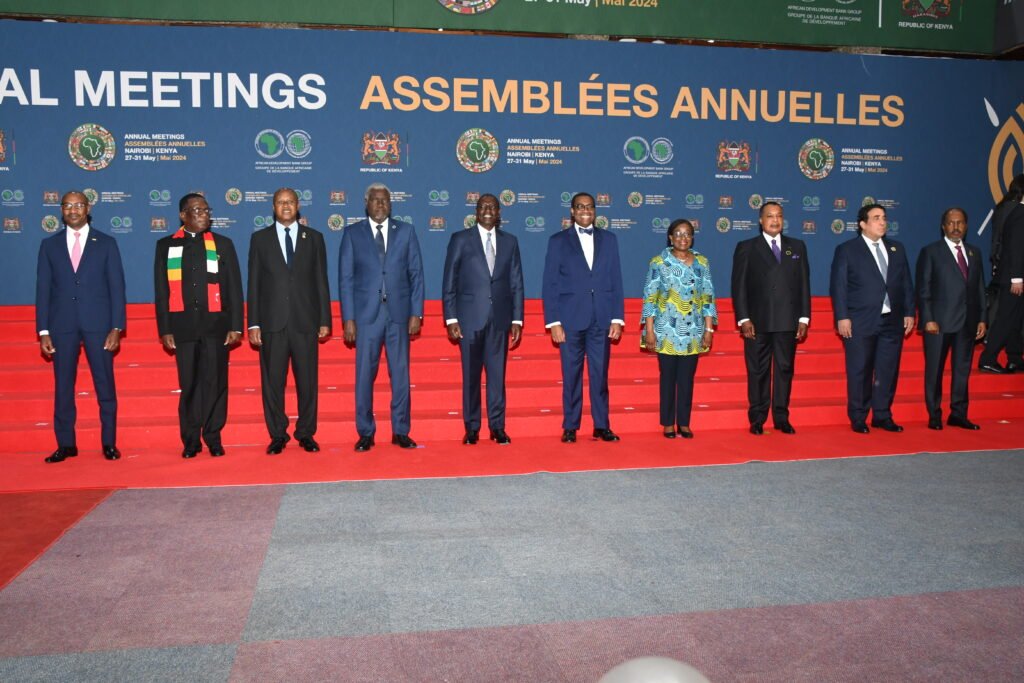Several Heads of States and Governors from the African continent gathered in Nairobi on Wednesday, May 29, for the 59th Annual Meetings of the African Development Bank (AfDB) to reflect on the progress the continent has realized from the financing institution.
President William Ruto, who presided over the opening session at Kenyatta International Convention Centre, said AfDB has demonstrated to the African countries the financial requirements they needed to work on, citing food security, infrastructure, youth and women empowerment, and entrepreneurship.
He said countries needed to enhance their shares to enable the institution support them financially.
“We must give them the stamp of approval and support so that they can support us,” Ruto said.
He appealed for a substantial replenishment of the AfDB fund by at least Sh25 billion to increase its capacity to continue providing concessional financing to the least developed countries in Africa.
“We call on our donors and development partners to scale up their investment in our continent‘s premier development financial institutions,” he said, adding that Africa has been profiled negatively for too long.
He called upon the development bank to write a new “Africa credit| narrative on an Africa credit agency by putting in place factual information into the architecture.
“Our GDP is not correctly valued and our huge resources such as energy and the 60 percent arable land are not factored,” said the President.
The continent, he noted, should depart the barrier of a global financial architecture that was fundamentally misaligned with its aspirations.
“We routinely borrow from international markets at rates far above those paid by the rest of the world, often up to 8 to 10 times more. These rates are said to factor in an arbitrary risk profile that is notably not applied when considering mineral extraction, even in areas of active conflict,” he stated.
He said there was need for the African continent to urgently develop and implement transformative interventions that would drive the prosperity of the continent’s countries’ and peoples’ lives.
Ruto expressed confidence that the sense of urgency resonates strongly among Africa’s leaders who were making progress to grow the economies of the continent’s Gross Domestic Product (GDP).
“Our continent is growing at the world’s fastest growing rate, exceeding the global average of 3 percent and 11 of the world’s economies in 2023 were African,” he said.
Between 2000 and 2022, Africa‘s real GDP increased at an annual rate of 4.3percent, which is above the global average of 2.9 percent. Seven of the world’s 10 fastest growing economies were in Africa.
The President lauded AfDB for financing 5,432 projects of which 4,036 were complete and for providing mechanism to coordinate the fight against poverty, improved the standards of African financial and other institutions and contributing significantly to conflict prevention and resolution.
The President however observed that the pace of African economic growth and development has not kept up with the rest of the world, and that it remained far behind its undeniable potential.
“Intra- African trade remains low, with its share of global GDP less than 3 percent. Africa’s share of global trade is also low at 2 percent and our exports are primarily unprocessed produce and raw materials,” he stated.
Ruto said the economies of the continent continued to bear the burden of rising costs of serving huge national debts, caused by high global interest rates and external shocks besides confronting challenges such as geopolitical risk, effects of armed conflict, disruption in global supply chains, climate changes and macroeconomic instability.
He expressed confidence that the strong positive response by African leaders and nations to the African Union’s Agenda 2063 signals their collective intent to undertake a radical transformation of African economies, achieve sustainable development goals and unite people in prosperity.
“We have what it takes to succeed, and current activities show movement in an encouraging direction,” he said.
“We must believe in ourselves first and stop outsourcing solutions we can provide for ourselves,” he added.
The President observed that for Africa to achieve the transformation, a consistent commitment of substantial resources was required to invest in infrastructure and industrial capacity to deliver the growth.
Ruto said the financial architecture that Africa was advocating for should integrate the continent’s most challenging development issues of debt sustainability and climate vulnerabilities to enable the achievement of the Sustainable Development Goals and Agenda 2063 commitments.
He said the AfDB High 5s strategies and objectives of the newly adopted 2024-2033, 10 year strategy provide important foundations for the critical continental objectives in addressing debt sustainability and climate vulnerabilities.
The meeting supported the proposal to re-channel Special Drawing Rights through the AfDB as endorsed by the African Union’s Assembly of the Heads of State and Government.
In his remarks, the President of Rwanda Paul Kagame said the Africa continent needed to change from the past mindset to the present, to think and act correctly and leaders to come out of the meeting with commitment and conviction that they would do what they have agreed upon and come out with results.
“We must talk and speak with one voice. We need to diversify and invest in our continent since the resources we have are not enough,” said Kagame, adding that the private sector also needed to mobilize more resources and invest in the continent.
The President of AfDB Akinwumi Adesina said since the launch of its priorities in 2016, the institution has impacted the lives of over 400 million people, provided 11 million farmers access to improve agriculture, while a total of 8 million people have been provided with access to new sanitation services.
Adesina added that at another 3.5 million people have had access to improved transport, 2.8 million have been provided with better health services while 1million have been provided access to free water while over 443,000 enterprises have benefitted from funding.


